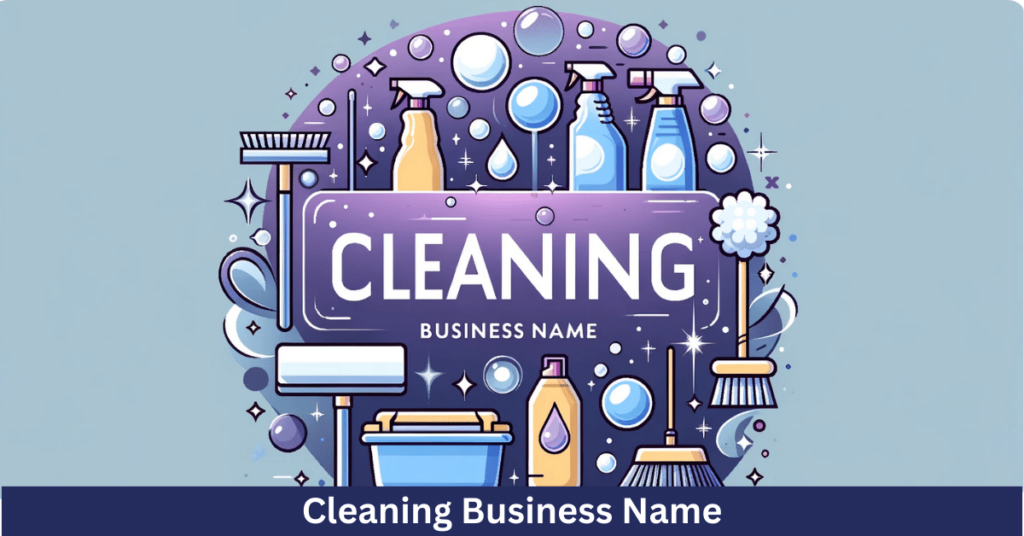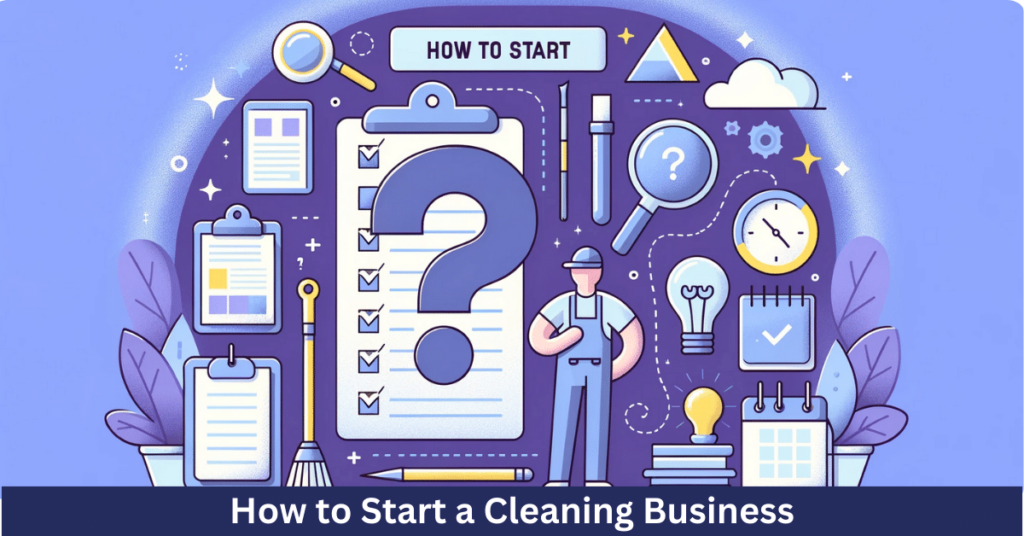Starting a cleaning business may not be too hard but making it successful definitely is. However, if you have a business plan right from day one, you have a better chance of becoming a renowned name locally in no time.
Taking your business forward without a business plan is like planning a road trip without a map.
Yes, you know your final destination. But how long will it take you to get there? Are there stops in the way? What obstacles can you face?
A business plan helps you deal with all these things beforehand so that you experience little to no surprises in your journey. In this article, we discuss how to make a cleaning business plan and how it can help you progress in the cleaning industry.

What is a Business Plan?
A business plan is a road map, or a compass of sorts, that helps you formulate and carry out your cleaning business’s goals. A cleaning business plan typically includes:
An overview of the cleaning sector in general
- The cleaning company's mission statement
- Short-term and long-term goals
- Estimated costs
- Estimated income
- Budgeting
- Licensing and Insurance
- Services Offered
How Helpful is a Cleaning Business Plan?
The demands of the cleaning industry keep changing. So, your cleaning business plan will need to be updated and changed accordingly.
Despite the changes, the crux of a business plan should be to help you stay organized. Keep a clear focus, and be prepared for any unexpected circumstances or costs.
Having a formal plan will help you set better goals, measure your progress when you’re short on time (you can always read through it), and make sure you know where your money is going.
By writing down what you want to accomplish in the short-term, long-term, and even five years from now, it’s much easier to stay focused when the going gets tough.
Likewise, if you intend on getting funding from an external investor, they might want to learn all about your business. A business plan gives them the insider’s view of your service, helping them decide if they want to invest in you or not.
What Should You Include in a Business Plan?
To make your business plan a success, here are a few sections it must have:
- Executive Summary
- Mission and Vision
- Company Summary
- Objectives
- Services
- Management Summary
- Financial Plan
- Market Research
- Operations
- Implementation Strategy
Executive Summary
The executive summary is the first section in your cleaning business plan, but you should write it last since it’s a summary of some important parts of the plan.
Basically, you have to summarize the following sections of the business plan in this part:
- Problem: Firstly, discuss the problem you’re solving. What are you offering the customer that will resolve their problem? In this case, the problem is that homeowners either don’t have the time or don’t want to clean their homes.
- Solution: Which service are you offering to solve this problem? You’re cleaning their homes or offices for them.
- Market: Who is your target market? If you have a commercial cleaning business, your target market might be schools or offices.
- Competition: Who are you competing with? How long have the other companies been in business, and how well are they doing? Your business plan should explain how you’re better than any other commercial cleaning business.
- Financial Highlights: Finally, include performance statistics, profits, and sales figures in your Executive summary.
Mission and Vision

These are two important things that will reflect the essence of your business. Your company’s mission statement is a summary of your business goals and purposes. It’s the image that you intend your business to portray.
Your mission statement identifies the guiding principle around which all corporate activities revolve. It answers a question: “Why do we exist?” Mission statements often require some re-work every few years- as technology or market conditions change.
For instance, as a cleaning business, your mission might be to make ‘today’s busy homeowners’ lives easier,’ or you may want your mission statement to exude sustainability and eco-friendliness.
On the other hand, vision is your long-term goal. It’s what you want to achieve in the future.
Company Summary
A company summary or overview summarizes important aspects of your business, including legal structure, management strategy, and history. While it’s usually the shortest chapter in the whole business plan, it’s not necessarily the least important one.
It will include the following information:
- Overview: In this section, you’ll sum up everything about your company, such as your services and target audience. For instance, if you’re a commercial cleaning business, you can mention that in this section.
- History: Give some back story for your company, such as the founder and whether there was an inspiration behind this business. You can later put this information on your website too.
- Legal Structure: You must decide on a legal structure for your company. Is it an LLC or a partnership? If you’re a corporation, is it an S-corp or a C-corp?
- Ownership: Who owns the company? If it’s a partnership, how much percentage is each partner’s share? All this information goes here.
- Management Team: In this section, you’ll talk about the chief roles in the company. Who is doing what? You can discuss key roles in a hierarchy.
- Workspaces: Do you have several locations in the city? In this section, you’ll write details about your facilities and locations.
Objectives
Your business objectives are what you want to do as a company and things you want to achieve. These could be your aims for profit, provision of quality services to clients, or using green cleaning products to ensure environmental protection.
Typically, there are four kinds of business objectives:
- Economic: These are monetary objectives or the financial progress you want to make in a certain time.
- Human: These are related to your customers or employees. For instance, you might want the betterment of your customers in any way or hire employees without any sexual, ethnic, or gender discrimination.
- Organic: These objectives are associated with your business expansion and growth.
- Social: You may have business objectives for the betterment of society. For example, you may give 5% of your annual revenue to a local charity.
Services
Your cleaning company business plan should also include information about the services you provide. If you’re a commercial cleaning business, your services will be more extensive than a residential cleaning company.
Make sure to include all your services, whether they’re exclusive or an extension of another service. Don’t worry; you can add more to this section later as your business grows.
Management Summary
Management summary sheds light on how you will manage your cleaning business operations. Be very careful when writing this section since it will affect your future decisions as a business owner.
Come up with a management summary by using your profits, operational costs, and pricing. It will give you an idea of how soon you can hire more employees for the company. The summary should include the following things:
- Number of employees and their salaries
- Number of employees you need to reach your goals
- Estimated profits
- Estimated expenses
As you scale your business, the management summary section of your business plan will help you in decision-making. Some managers may even consider it the most important section in a business plan.
Financial Plan

A business operating without the know-how of its finances will be blind in terms of where it’s going. That’s why you must write a financial plan for your cleaning business. If you don’t consider yourself versed enough, you can hire an accountant or a bookkeeper.
Likewise, a financial advisor could potentially help you evaluate company finances and look for any concerns in the plan. Here are a few things you must include in your financial plan:
- Expense budget
- Business ratios
- Balance sheet
- Break-even analysis
- Start-up funding
- Sales forecast
- Projected cash flow
- Projected loss and profit
Once you add all these things to your business plan, you will have a much clearer image of how far you can go – financially – by the end of the year. Plus, when your finances are laid out in front of you, it will be easier to spot any room for improvement.
Market Research
Market research is imperative since it will specify the kind of customership you are looking at. Do you plan on serving residential customers, or are you going to offer your cleaning services to commercial businesses?
You also have to define your typical customer. It will help narrow down a demographic for your marketing and advertising campaigns.
If there are certain holidays or seasons that prompt more sales, include those in this section too. For instance, you may notice a spike in cleaning services hires near the holiday season.
While you’re conducting market research, it also helps to take a look at your competitors. Who will you be competing with, and which particular demographic are they targeting?
Operations
Specifying your operations in the cleaning company business plan is also imperative since it will lay a framework for future work. Here are a few things to include:
- Booking Appointments: How do you plan on taking appointments? How many appointments will you take in a day? You also have to decide how your customers can book an appointment. While the phone is the simplest option, you might want to offer website and in-app bookings too.
- Cleaning Equipment: Along with listing the equipment you currently have, you also need to determine the equipment you need and its cost.
- Transport: How will you commute to the client’s offices or homes? Will your staff take the same mode of transportation? If you plan on bringing more vehicles in the future, you can also write that here.
- Payment Terms: You also have to determine the payment terms. How will customers pay for your cleaning services? Do note that offering more payment options will get you more customers.
Implementation Strategy
Finally, the implementation strategy in a cleaning company business plan highlights the sales and marketing strategies. You must have a goal in mind for the number of customers you want to reach by the end of the year. How do you plan to do this?
Your marketing strategies can be spread across multiple channels, such as:
- Flyers
- Facebook Ads
- Google Ads
If you have any milestones, such as quarterly goals, you can add them in this section. Plus, put your sales strategies and forecast here too.
Conclusion
The cleaning industry is getting bigger and more competitive with every passing day. The only way to make a place for yourself in this growing field is to do your homework beforehand. A cleaning business plan contains everything from your cleaning website & marketing strategy and all the way to business objectives and overhead costs.
So, you are fully prepared for anything that might come your way. It also helps put things in perspective, making your goals seem more achievable and tangible since they’re on paper.
Therefore, it’s important for every budding cleaning business to devise a business plan to ensure success and growth
Frequently asked questions
Have some questions about your cleaning business, see below for some commonly ask questions
Whether you’re writing a commercial cleaning business plan or for your residential cleaning services, make sure you keep it simple. Plus, revise it when required. When you’re writing your first draft, make sure you make it well-detailed.
It doesn’t have to be perfect but should have sufficient room for excluding information without thinning the content too much. More importantly, do not set on writing your business plan alone. Many cleaning business owners make this mistake.
Work with other people in the company as you need all the insight you can get.
Experts suggest you update your business plan every year. But there’s no standard duration for revisions. Since it’s your own business plan, you know best when it’s time to add or change something.
Since residential cleaning service providers are usually working on a small scale, they have low start up costs. Plus, as a home cleaning service, your goals will be less extensive than a commercial cleaning service.
Moreover, the marketing tactics, target customer, and sales strategies will also be different.
The senior executives in the company can write a cleaning business plan. If you’re a solo rider and own the company, write it yourself. You may take a financial advisor or marketer’s help at some point in the way, but that’s about it.





